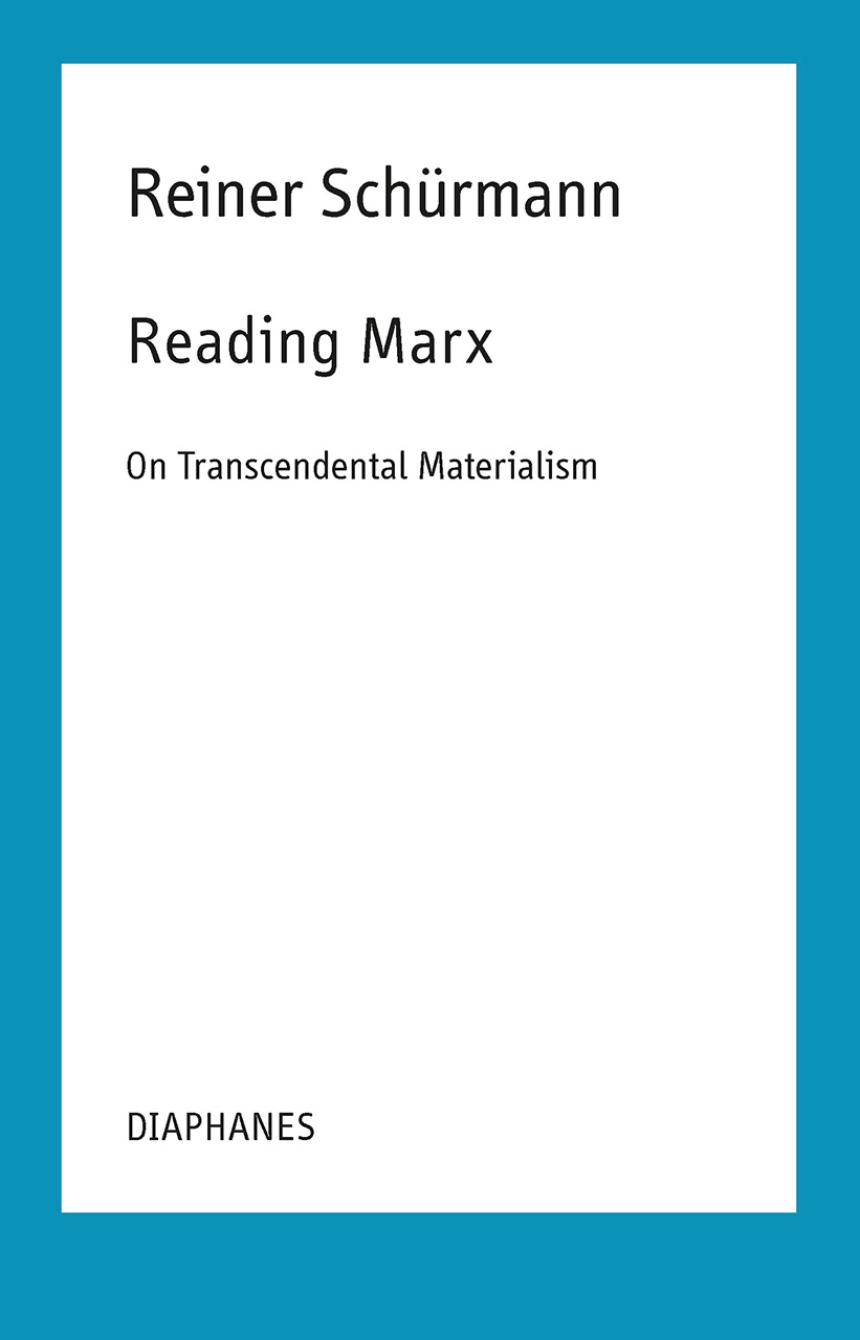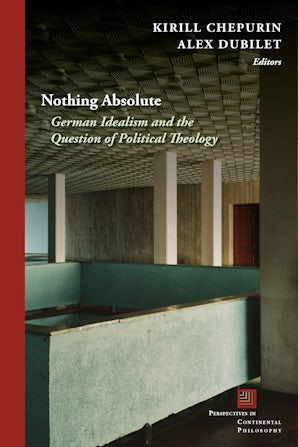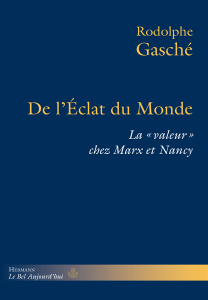 Practice, Power, and Forms of Life: Sartre’s Appropriation of Hegel and Marx
Practice, Power, and Forms of Life: Sartre’s Appropriation of Hegel and Marx
The University of Chicago Press
2022
Cloth $35.00
200
 Practice, Power, and Forms of Life: Sartre’s Appropriation of Hegel and Marx
Practice, Power, and Forms of Life: Sartre’s Appropriation of Hegel and Marx
 Reading Marx: On Transcendental Materialism
Reading Marx: On Transcendental Materialism
 Nothing Absolute: German Idealism and the Question of Political Theology
Nothing Absolute: German Idealism and the Question of Political Theology
 De l'Éclat du Monde: La « valeur » chez Marx et Nancy
De l'Éclat du Monde: La « valeur » chez Marx et Nancy
 The Language of Touch: Philosophical Examinations in Linguistics and Haptic Studies
The Language of Touch: Philosophical Examinations in Linguistics and Haptic Studies
 German Philosophy: A Dialogue
German Philosophy: A Dialogue
 The Worker: Dominion and Form
The Worker: Dominion and Form
 In Defense of Phenomenology: Merleau-Ponty’s Philosophy
In Defense of Phenomenology: Merleau-Ponty’s Philosophy
]Reviewed by: John Shand (The Open University)
The main title of this book suggests that it is a defense of phenomenology. An interesting and alluring idea. In fact the book is not a general defense of phenomenology, but is, as the subtitle suggests, an account of the philosophy of Merleau-Ponty, and thus of his particular brand of phenomenology – in the course of this it is also a defense of Merleau-Ponty’s phenomenology, since the author holds that it has been misunderstood, or at least in certain crucial aspects fundamentally misrepresented. The particular villain of misunderstanding is Vincent Descombes in his venerable, but still quite widely read, introductory book Modern French Philosophy first published in French in 1979 and in English in 1980. It is unclear how influential Descombes book still is however, leaving one to wonder whether his view of Merleau-Ponty is still the prevailing one that might justify the effort involved here of showing up its flaws. Still, if the view presented by Descombes is mistaken, that gives some grounds for thinking such a misunderstanding as his needs countering, as it might turn up anywhere. It is also worth noting that one would be unlikely now to recommend Descombes book as a first introduction to phenomenology when there are more recent books, quite possibly better ones that do not take Descombes’ view of Merleau-Ponty, such as David E. Cooper, Existentialism, (second edition, Blackwell, 1999) and Michael Hammond, Jane Howarth, Russell Keat, Understanding Phenomenology (Blackwell, 1991). Descombes’ book is conspicuously absent from Cooper’s bibliography.
Still, the first main section of Douglas Low’s book is a systematic and detailed refutation of the view of Merleau-Ponty as presented by Descombes. It is this that I shall concentrate on in this review. There are three other chapters in the book: ‘One Merleau-Ponty, Not Two’, ‘Merleau-Ponty’s Criticism and Embrace of Hegel and Marx’, and ‘Marx, Baudrillard, and Merleau-Ponty on Alienation’. As can be seen from this, the book is a set of essays, rather than an integrated work, but one linked all the time by the philosophy of Merleau-Ponty.
So let us look at the issue of Merleau-Ponty’s basic philosophy, and how it might be misunderstood. Low’s principal objection to Descombes is that he portrays Merleau-Ponty as a subjectivist, albeit of an absolute idealist sort, derived from misunderstanding Merleau-Ponty’s view that the self is involved in every understanding of the world. Whereas the truth of the matter is that Merleau-Ponty wishes to find new categories to overcome the dichotomies of subject and object, and mind and body. What eliminates the putative gap is the human body which looks both ways: it constitutes, and is essential to being, a subjective self, while at the same time it is the way we encounter the world and is an object in the world.
Before looking at what Merleau-Ponty might or might not have said about the problem of our understanding the world and our place in it, let us consider the problem itself. The traditional problem is essentially of Cartesian manufacture. The way it is set up by Descartes opens, as it turns out, an unbridgeable gap between our ideas of the world and how the world really is, or at least our being able to know how the world really is. The approach of phenomenology as it developed from Husserl’s initial version of it, the new version, a version common in certain basic respects to that of Heidegger and Sartre (just to pick out the major players) is to undercut the ideas-representation/world dichotomy. The attempts to go from idea-representation to the world by various means has tormented philosophy ever since Descartes. The approach of the new phenomenology is a variation of the old joke that if I wanted to get to there I would not start from here, as well as showing that the proposed starting place is in fact, as described, not a place from where one could start.
Descartes not only thought he had to set aside all that he could not be certain he knew to be true in order to build up a picture of how things are uninfected with falsehoods, he thought that such a picture should strip away all that makes the view dependent on contingent features of a perspective, all the things that make it my view, for with these in place we would not have a view of how things are in themselves, but rather a subjectively corrupted view of how they appear to creatures such as ourselves. What he was aiming for was an objective-conception, God’s-eye, view of reality that could then with justification be taken as showing how reality is, one not polluted with the trappings of a perspective. But once he retreats to the idea-representations of the world in his mind he finds it impossible to get out again so that he might be sure that any of them may be known to correspond to how the world actually is. The desperate nature of his plight is shown by the desperate measures he takes in drawing on a dubious medieval argument for the existence of God so that God may act as the guarantor of the truth of things he clear and distinctly perceives, for it is inconceivable that God would allow him to be deceived when he has made his best and most honest effort to grasp the truth.
From then on much of the history of philosophy becomes an attempt to solve the conundrum set up by Descartes, but, and this is crucial, still in Descartes’ terms and with his assumptions. One of the most obvious lines taken is various forms and degrees of idealism. If we cannot epistemically bridge the gap between our ideas of the world and the world in itself, one approach is to bring the world back into the realm of ideas. Obviously some distinction needs to be maintained between how things are in a merely subjective sense, thus how they are objectively; but this is done by epistemic devices and identifying features within the realm of ideas. Thus we have Kant’s transcendental idealism where objectivity is derived from those conditions that are necessary for the very possibility of experience, ‘the world’ being the sum total of such possible experiences. But because Kant was unable to give up completely on the idea of things as they might be, independently of any of the modes of acquaintance by which we may access them, he posits thing-in-themselves or noumena. To stop having something like noumena left hanging we move onto absolute idealism where ultimately the fully developed mode of knowing the world and the world itself are one. If you cannot get from ideas to the world, bring the world into the fold of ideas, thus making it in principle completely knowable. But this leads to one huge problem for many: plausibility. And it is not just nineteenth-century European philosophy that wrestles with bridging the Cartesian gap, one can see it running through the writings on epistemology and perception in twentieth-century analytical philosophy, at least until the later Wittgenstein and with him the first signs that a new radical approach was needed.
That approach on the continent is the new phenomenology. What is crucial to understanding it, and in particular the way that Merleau-Ponty presents it, is to show how Descartes is simply not entitled to use all the concepts, or ideas, that he has about the world, given where he starts from as a disinterested, disembodied, pure consciousness. Descartes simply helps himself to these concepts – through which he might articulate a view of reality, and then wonders whether such articulations are true – and does so unquestioningly and without entitlement. He is not entitled to the meanings that these concepts provide, without which no truth (or falsehood) may be articulated about the world, because from the point of view of a God’s-eye objective disembodied pure consciousness, no sense of the meaning of being would arise at all that might be captured in any concepts whatsoever. Now when we look as to why he is not entitled to the articulating concepts that present to us a world that has determinate being, we see that such concepts, and such a world, only arise at all because we are not a disinterested, disembodied, pure consciousness, but are rather creatures that are a interested, embodied, impure consciousness. By this is meant that what gives any sense and meaning to the world, such that it may be thought of at all, is our being contingently-configured, engaged, embodied, creatures, and the particular senses and meanings that emerge reflect the particular form of our contingently-configured embodiment and engagement. It’s hard for us to notice this, as it was difficult for Descartes, because such modes of thinking are so pervasive, habitual and taken for granted. It’s only when we step back that we see that our very modes of thinking about the world depend on something that means that the ideas-representation/world gap is not merely bridged, but also eliminated because it could not have existed. For Merleau-Ponty, as Low clearly explains, that eliminator of the ideas-representation/world is the body. Crucially – and this needs emphasising – the body does not bridge the gap – it is not another solution to the traditional Cartesian problem – rather, if it is understood properly, it is the entity that is both a realm of ideas and the realm of the world. Dual featured, it is both, taking the first two together, the mode by which any understanding of our understanding of the world is possible, and the mode by which any understanding of the world is possible, while also being an entity in the world understood. Our bodies are, as Low puts it, that little bit of the world by which the world understands itself. And the crucial feature of the body is that it allows us to be engaged with the world. It is of us and of the world. It is only by being engaged with the world that the being of the world may be something to us (and to any understanding creature, although they may have different contingent-configurations). To put it crudely, only by bumping into things in the world do things come into being for us, have significance, as articulated in concepts that go on to have normative interconnections – thus, say, solid and liquid become opposed terms. The bumping into may be more or less literal of course – let us perhaps call it a matter of resistance and limits – so that things become such that they cannot be passed through, or are out of reach, or are unliftable, or have a beginning and have an ending. And such resistance and limits may only arise from being embodied, and embodied in a manner that must necessarily be determinate in some way or other. Thus all the meanings that Descartes used to speculate as to whether things could be known to be true or how things really are are meanings that could only arise by there being a world to which the meanings apply for us. Without being embodied and engaged in the world, it would be an undifferentiated homogeneous ineffability – this of course Kant understood when he posited noumena, even if he did not see the full significance of why such a world would be, or should be, strictly speaking inarticulable – and that only by a contingent mode of engagement with the world provided by a body does the world become something ‘bumpy’ so to speak, with peaks and troughs of significance and degrees of interest which concepts can mean. For a disinterested, disembodied, pure consciousness, (it is questionable indeed if such a thing is possible for it may be argued that it could have no thoughts) there would be no guiding motivation to develop any concepts which might express an understanding of the world at all, nor one might add an understanding of ourselves, a self. Why would there be? Without an other there can be no self and without a self there can be no understanding of the other. A view from nowhere is no possible view at all.
Merleau-Ponty’s is quite possibly the clearest account of this position – far more so than the later Husserl, or Heidegger or Sartre. Indeed Merleau-Ponty thinks that Sartre in his distinction of the for-itself (conscious self-awareness) the in-itself (non-human things) perpetuates too much the traditional mind/world distinction, and again leaves himself with a gap to be bridged. For Merleau-Ponty the body is both mind and world, and the understanding of the mind without the world and the world without the mind is impossible –each entails otherness. This also denies materialism as well as idealism. He shares however the primary thought that because of the, as it were, assumptions of the body, how we think about the world because of the contingently-configured body means that we are thrown into the world-ready-made. And we are thrown in as human beings qua human beings. It presents itself to us already there as being – it is not something we construct from the impressions on a mental tabula rasa. This may be modified by personal and cultural variations, but as Low explains quoting Merleau-Ponty, because of the durable commonality of the flesh, my world is essentially the same world as that of Plato and Aristotle. (cf p.12). Nothing is reached as it is in itself for it is necessarily encountered through the human body, but what is reached is always perceived gestalt as something that goes beyond the perception and with an awareness of its being something other.
Low’s is an excellent book, and he makes his case convincingly. It does something not only towards giving a better understanding of Merleau-Ponty, but also to clear up a possibly misunderstanding of him that may detract from our realising his importance. If anyone should lead the new phenomenological approach and show up the mistaken assumptions of much of previous philosophy, then Merleau-Ponty is an excellent candidate, and it is clear that he deserves more attention than he gets in philosophical academia. As hinted earlier, his approach has much in common with the later Wittgenstein when it is closely examined. The common approach, with noted differences, between Heidegger and Wittgenstein has recently been well explored in Lee Braver, Groundless Grounds: A Study of Wittgenstein and Heidegger (The MIT Press, 2012). It would be fascinating and fruitful for someone to do the same with Merleau-Ponty and Wittgenstein. Your next project, Professor Douglas Low!?